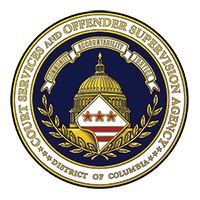WHAT WE DO | Community Supervision Program
CSOSA’s Community Supervision Program is the probation and parole system for adults in the District of Columbia. CSOSA’s approach to community supervision emphasizes assessment, intervention, and accountability. In addition to the conditions of release imposed by the Superior Court for the District of Columbia (for individuals on probation) or the United States Parole Commission (for individuals on parole or supervised release), CSOSA develops an individualized supervision plan for each person entering supervision. Based on a comprehensive assessment, this plan identifies the person’s specific risk level and needs, as well as the specific program strategies that can be employed to meet those factors. This program strategy, coupled with stringent standards of contact and surveillance helps CSOSA protect the public and provide the men and women we supervise with the services they need to improve their lives.
CSOSA strives to be a model community supervision agency that is recognized for positively impacting public safety. We constantly work to refine and enhance our evidence-based practices.
CSOSA Supervision Types
Probation is a disposition ordered by the Superior Court of the District of Columbia through which an adjudicated individual is placed under a term of community-based supervision administered by CSOSA.
Parole is a form of early release from prison based on an individual’s positive adjustment to rehabilitative goals that were established during the incarceration portion of a sentence as determined by the United States Parole Commission (USPC). Parole, as a type of community-based supervision, was abolished in the District of Columbia for individuals sentenced after August 5, 2000. After that date, eligible individuals are subject to a period of supervised release following incarceration.
Supervised Release is a term of community-based supervision served after an individual is released from prison. The court can impose supervised release during sentencing in addition to the sentence of incarceration. Unlike parole, supervised release does not replace a portion of the sentence of incarceration, but is in addition to the time served in prison and begins only after a person has served at least 85% of the prison sentence. The individual is subject to specified conditions of supervised release that are intended to prevent the offender’s return to incarceration. In the District, the USPC oversees supervised release and CSOSA administers it.
Civil Orders of Protection are civil orders imposed by the court for a period of 12 months to protect an individual from abuse or harassment by another person.
Deferred Sentencing Agreements may occur in domestic violence cases. In these cases, a defendant enters a guilty plea and the court and the prosecutor agree to defer sentencing for nine months.
Additional Information
Read on to learn more about the population we supervise and our strategic goals.


